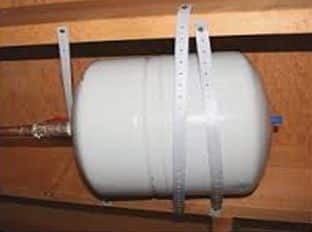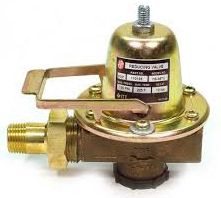Hydronic heating systems offer a comfortable and efficient way to warm your home. In contrast to traditional forced-air systems, hydronics use heated water circulating through a closed loop of pipes to radiate warmth. This method provides even heat distribution, improved air quality, and potentially lower energy costs.
If you’re considering a hydronic heating system for your home, understanding its key components is crucial. Here, we’ll delve into the four essential parts that make a hydronic system function:
Your hydronic heating system is a closed system. The water in the heating system is separated from your drinking water, and you are protected by a one-way valve from heating water back flowing. Water is not compressible. As your system heats up from room temperature the water expands, increasing the water volume. This extra volume needs somewhere to expand to. Hence, we have expansion tanks. The tank contains a cushion of air that can compress as the heating system water expands.

The boiler acts as the furnace of your hydronic system, responsible for heating the water that circulates through the pipes. Various boiler types are available, each with its own advantages and fuel preferences.
Fuel Types: Popular options include natural gas, propane, oil, and even electricity.
Boiler Efficiency: High-efficiency boilers boast better fuel utilization and lower operating costs. Consider condensing boilers that capture waste heat for additional efficiency.
Boiler Sizing: Choosing the right boiler size is crucial. An undersized boiler won’t adequately heat your home, while an oversized one wastes energy and money. Consult a qualified hydronic heating professional for proper sizing

The circulator acts as the pump, pushing the heated water through the closed loop of piping. Its role is to maintain consistent water flow and ensure even heat distribution throughout the system.
Circulator Types: Choose between variable-speed and fixed-speed circulators. Variable-speed models adjust their output based on system demand, leading to increased efficiency and quieter operation.
Flow Rate: The circulator’s flow rate should be sufficient to meet the heating demands of your home. A qualified installer will determine the right flow rate for your specific system.
The piping network delivers the heated water from the boiler to the emitters and back again. The type and size of piping used are crucial for system performance and longevity.
Piping Material: PEX tubing is a popular choice for its flexibility, affordability, and ease of installation. Copper pipes offer excellent durability but are more expensive and labor-intensive to install.
Pipe Insulation: Proper insulation prevents heat loss from the piping, maximizing system efficiency and reducing energy costs.
The emitters are the final component, transferring heat from the circulating water to your living space. Different types of emitters offer varying heat distribution and aesthetic appeal.
When A, B, or C are out of sync, it usually results in disruption to your heating system and component failure. In extreme cases, the boiler could fail. The key to keeping these components working together is annual maintenance.
Here’s an example of what can go wrong:
Say the expansion tank loses its air cushion from a lack of maintenance. The water has nowhere to expand to, so the relief valve goes off every time the boiler heats up. To counteract the continuous loss of water, the automatic fill valve keeps topping the boiler up with water. Eventually, you hear gurgling or banging in the system, or you lose heat altogether. We come along and find that A caused B to fail, and B caused C to fail. If you are unlucky, these components caused the circulating pump, or pumps, to fail. In the worst scenario, the boiler fails and the bill is $7,000 to $10,000.
If you live in Marin or Sonoma County and need help with your hydronic heating system, please call John Owens Services, Inc. We work on all types of boilers in Santa Rosa & the surrounding cities, and are a Rinnai authorized dealer and installer for your peace of mind.
Our philosophy is simple, we always want to maintain equipment to give it the longest life possible. Next, we want to focus on repairing when something goes wrong. Then only as the last choice, we replace equipment when needed. That’s the John Owens Way.